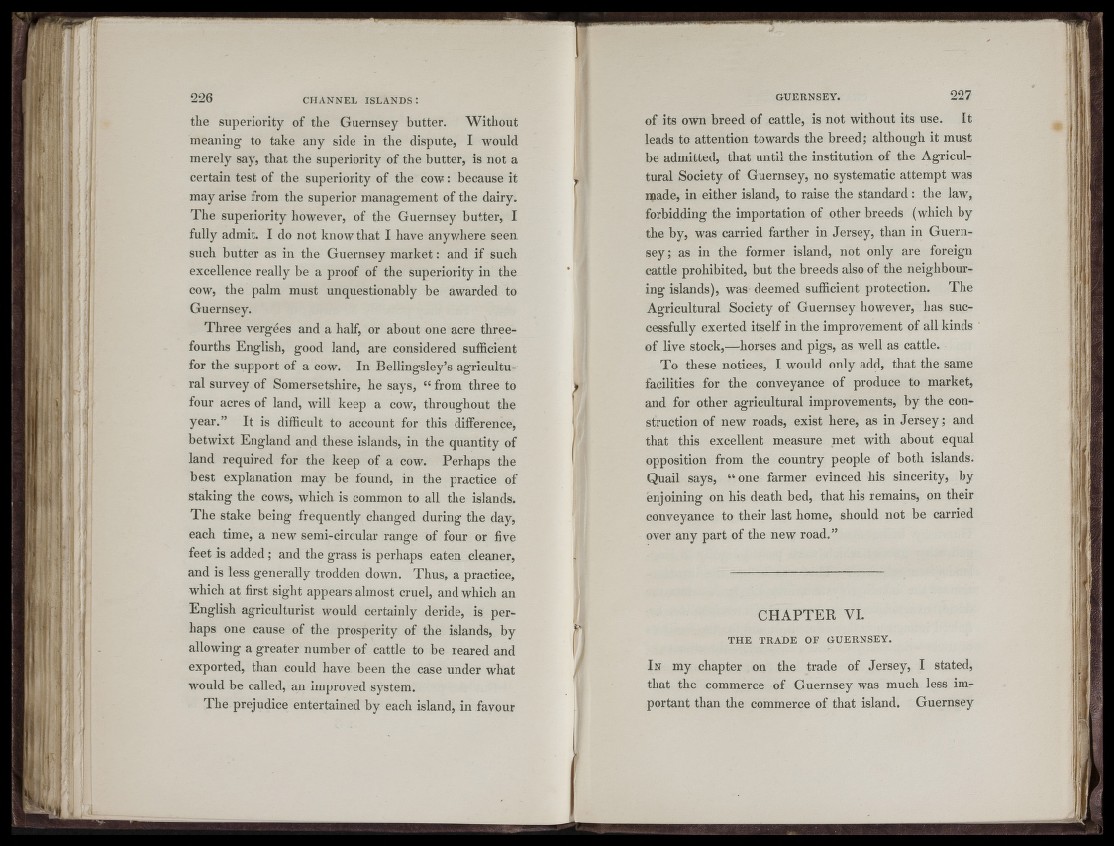
1
I* II
II*I?t
the superiority of the Guernsey butter. Without
meaning to take any side in the dispute, I would
merely say, that the superiority of the butter, is not a
certain test of the superiority of the cow : because it
may arise from the superior management of the dairy.
The superiority however, of the Guernsey butter, I
fully admit. I do not know that I have anywhere seen
such butter as in the Guernsey market : and if such
excellence really be a proof of the superiority in the
covq the palm must unquestionably be awarded to
Guernsey.
Three vergées and a half, or about one acre three-
fourths English, good land, are considered sufficient
for the support of a cow. In Bellingsley’s agricultural
survey of Somersetshire, he says, “ from three to
four acres of land, wall keep a cow, throughout the
year.” It is difficult to account for this difference,
betwixt England and these islands, in the quantity of
land required for the keep of a cow. Perhaps the
best explanation may be found, in the practice of
staking the cows, which is common to all the islands.
The stake being frequently changed during the day,
each time, a new semi-circular range of four or five
feet is added ; and the grass is perhaps eaten cleaner,
and is less generally trodden down. Thus, a practice,
which at first sight appears almost cruel, and which an
English agriculturist would certainly deride, is perhaps
one cause of the prosperity of the islands, by
allowing a greater number of cattle to be reared and
exported, than could have been the case under wffiat
would be called, an improved system.
The prejudice entertained by each island, in favour
of its own breed of cattle, is not without its use. It
leads to attention towards the breed; although it must
be admitted, that until the institution of the Agricultural
Society of Guernsey, no systematic attempt was
made, in either island, to raise the standard: the law,
forbidding the importation of other breeds (which by
the by, was carried farther in Jersey, than in Guernsey;
as in the former island, not only are foreign
cattle prohibited, but the breeds also of the neighbouring
islands), was deemed sufficient protection. The
Agricultural Society of Guernsey however, has successfully
exerted itself in the improvement of all kinds
of live stock,—horses and pigs, as well as cattle.
To these notices, I would only add, that the same
facilities for the conveyance of produce to market,
and for other agricultural improvements, by the construction
of new roads, exist here, as in Jersey; and
that this excellent measure met with about equal
opposition from the country people of both islands.
Quail says, “ one farmer evinced his sincerity, by
enjoining on his death bed, that his remains, on their
conveyance to their last home, should not be carried
over any part of the new road.”
{ i i i *
C H A P T E R VI.
THE TRADE OF GUERNSEY.
I n my chapter on the trade of Jersey, I stated,
that the commerce of Guernsey was much less important
than the commerce of that island. Guernsey